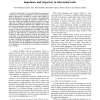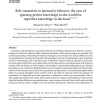2217 search results - page 79 / 444 » Learning from Collective Behavior |
128
click to vote
NN
2008
Springer
15 years 2 months ago
2008
Springer
dely acknowledged that categorically organized abstract knowledge plays a significant role in high-order human cognition. Yet, there are many unknown issues about the nature of ho...
101
click to vote
ALT
2000
Springer
15 years 11 months ago
2000
Springer
This paper provides a systematic study of inductive inference of indexable concept classes in learning scenarios in which the learner is successful if its final hypothesis describ...
149
click to vote
AIPRF
2008
15 years 3 months ago
2008
Unsolicited commercial or bulk emails or emails containing viruses pose a great threat to the utility of email communications. A recent solution for filtering is reputation systems...
ICRA
2010
IEEE
15 years 27 days ago
2010
IEEE
— Interaction of a robot with dynamic environments would require continuous adaptation of force and impedance, which is generally not available in current robot systems. In contr...
119
click to vote
COGSCI
2004
15 years 2 months ago
2004
Constraints and dependencies among the elements of embodied cognition form patterns or microstrategies of interactive behavior. Hard constraints determine which microstrategies ar...


